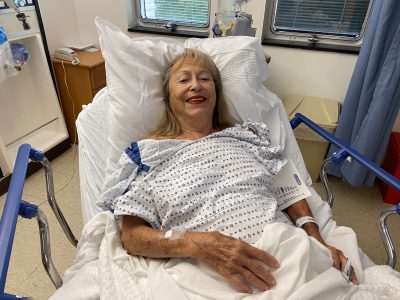Armonk Woman Recipient of Groundbreaking Pacemaker at NWH
News Based on facts, either observed and verified directly by the reporter, or reported and verified from knowledgeable sources.

It’s good that Vivian Utko has long considered herself a bit of a daredevil.
The 86-year-old former amateur pilot and retired musician and music teacher was scheduled in early August to have the leadless dual chamber pacemaker implanted in her to help regulate her heartbeat after she was diagnosed with atrial fibrillation this summer. In Utko’s case, her heart would sometimes speed up, while at other times would beat too slowly.
When Utko arrived at Northern Westchester Hospital on Aug. 30 for the procedure, she would be the first person at the hospital to receive the new pacemaker. She wasn’t at all nervous that something would go wrong, only a bit anxious that the hospital scheduled her procedure four weeks after the decision was made to use the new device.
“I was welcoming it,” said Utko, a lifelong Armonk resident, who had already had a stent put in to address 99 percent blockage in an artery this spring. “I hoped it would improve my health and help me get back to activity.”
Which is exactly what has happened. By the following day, Utko was released from Northern Westchester and was resting comfortably at home. Her main restriction was to avoid lifting anything heavier than a gallon of milk for about a week, she said.
What makes the new pacemaker, the AVEIR DR dual chamber model, different than the conventional pacemaker is that it’s not even noticeable to the patients or others, said Dr. Mark Abrams, the cardiac electrophysiologist at Northern Westchester Hospital who worked on Utko.
Abrams said while the transvenous pacemaker sits under the skin of the chest and comes through a vein and into the chambers of the heart, the dual chamber pacemaker, which was approved by the FDA earlier this year, doesn’t require an incision.
About five months ago, the dual chamber pacemaker started to be used by hospitals around the United States for certain patients.
It’s placed through a catheter that goes in a vein at the top of the leg, which is then put up into the heart under x-ray and the devices are implanted, one in the atrium, the other in the ventricle. When the procedure is finished, the catheter comes out, he said.
Abrams said there are obvious benefits to the dual chamber pacemaker over the transvenous one. In Utko’s case her active lifestyle – she is a master gardener and still plays the accordion and piano, even though she hasn’t flown in about 30 years – helped make her an excellent candidate for the new device.
“With Vivian, her concern was about the recovery period. She’s 86 years old but I think mentally is about 45, and so she wanted to be able to get up and get right back out there after her procedure,” Abrams said. “The fact that there’s no incision that has to heal really speeds up the recovery process and made her the perfect candidate to get the first one at Northern Westchester.”
As of earlier this month, Northern Westchester Hospital was the only medical facility between Mount Kisco and facilities in Albany equipped to handle the procedure, he said.
While there are some patients that might still need the wires in the transvenous pacemaker, there are other obvious benefits, he said.
The activity restrictions for the transvenous pacemaker would be about four to six weeks, including avoiding swimming pools or baths. With the dual chamber pacemaker, the restriction is about a week before resumption of normal activity, according to Abrams.
Without the incision, there is also less chance for there to be complications, he said, particularly in older patients.
“So for Vivian, this seemed like a perfect balance of helping her feel better by getting her the treatment that she needed with the help of the pacemaker, but also avoiding the need to have time for wound healing and activity restrictions and things like that,” Abrams said.
About 11 days after she arrived home, Utko said she was feeling vastly improved. Now, she’s ready to continue enjoying life with her family, including her husband, Boris, and their son and daughter, including getting back out into the garden and picking up the accordion again.

Martin has more than 30 years experience covering local news in Westchester and Putnam counties, including a frequent focus on zoning and planning issues. He has been editor-in-chief of The Examiner since its inception in 2007. Read more from Martin’s editor-author bio here. Read Martin’s archived work here: https://www.theexaminernews.com/author/martin-wilbur2007/
